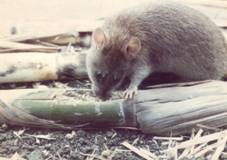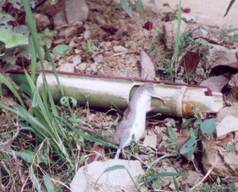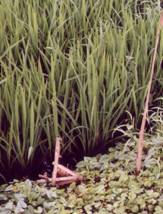Vertebrate pests comprise of birds, wild animals and small mammals,
especially rodents under Class Mammalia. Among them, rodents belong
to Order Rodentia represented by 34 genera and 104 species in
India. They cause both direct and indirect damages to various
crops/commodities by gnawing and contamination. The pre harvest
losses range from 5-15% to cereal crops like rice and wheat. It is
estimated that in Asia alone rice loss caused by rodents in a year
could feed 200 million people.
Rodents adjust to the cropping systems and patterns in agriculture
through their behavioural plasticity. They imitate crop behaviour
in rice, by establishing during the initial period of the crop,
breed during crop breeding period and emigrate after crop harvest.
They are capable of rapid population response to short term
variations, including seasonal fluctuation in temperature, humidity
and food availability. Moreover, they are also found to adjust to
Farmer with rat damaged tillers the
newer environments in the changing climate regime with their faster
mode of breeding, sometimes leading to major outbreaks. Individual
symptomatic treatments lead to induced rodent breeding by
immigrating rodents from peripheral areas. These ecological and
ethological intricacies are needed to be observed to arrive at
suitable management strategies to contain
Bandicoot damaging sugarcane these
pests.
 |
 |
|
Farmer with rat damaged tillers |
Bandicoot damaging sugarcane |
Rodents
also affect public health as vectors and reservoirs for bacteria
which cause zoonotic diseases such as plague, leptospirosis, scrub
typhus, Leishmeniasis, murine typhus and salmonellosis. NIPHM
extends technical support to National Centre for Disease Control
(erstwhile NICD), Ministry of Health and Family Welfare in
prevention of zoonotic diseases like plague, leptospirosis etc. The
joint efforts of the institute with NCDC resulted in reduction of
61% incidence of Leptospirosis in four South Gujarat districts
during 2009.
The
institute advocates behavoural and non chemical approach for rodent
management based on pest species. Practices such as indeginous
traps are encouraged complimenting other rodent management
practices. The institute even evaluated the efficacy of non
poisonous sticky traps against major commensal rodent pest species
in commodity and domestic situations.
|

Bamboo trap in North Eastern States |

Palmyra basket bamboo snap trap |

Bandicoot on sticky trap |
Nodal Centre for Implementation of National Plan on Rodent Pest
Management
Department of Agriculture and Cooperation (DAC), Government of
India launched a National Plan on Rodent Pest Management during XI
Plan period. To tackle the situation at National level, a National
Plan on Rodent Pest Management was launched by Department of
Agriculture & Cooperation, Ministry of Agriculture in October, 2010
with an outlay of Rs. 679.72 Lakhs for remaining part of XI Plan
period under Strengthening and Modernization of Pest Management
Approach (SMPMA) scheme. The institute is also Nodal Centre
supported by ICAR All India Network Project on Rodent Control for
implementation of the National Plan. Capacity building, awareness
creation and rodent control campaigns are identified activities in
the National Plan and NIPHM is instrumental in coordination and
monitoring of capacity building and awareness creation under the
National Plan. It also extends technical guidance to the Ministry
in financial allocations to take up rodent pest management
activities by different States.
Activities of the Division
NIPHM is actively involved in capacity building among various
stakeholders and provides consultancies to address specific
problems in endemic areas.
1.
National Training Programmes on Rodent Pest Management
These are basic level training programs for field extension
functionaries of States, UTs, junior level extension
scientists with 7 day duration. The training covers in-depth
information on rodent biology, ethological parameters and
principles for their management through participatory discussions.
Skill development on available options for rodent pest management
and actual control operations among the participants are developed
through batch wise participatory action in farmers' fields.
2.
Apex Level Training on Rodent Control
An Apex Level Training on Rodent Control of 3-day duration targets
the planning processes involved in rodent pest management for
personnel manning rodent control at Directorate of Agriculture and
district levels. The rodent pest/vector situation and
implementation status of rodent management practices in the
participating states/organizations will be analyzed and action
plans are being drawn for monitoring the rodent infestation after
community based rodent control campaigns.
3.
Trainer
Farmers' Training Programs
As one of the Farmer Led Extension Strategies, Training of Farmer
Trainers with 5 day duration are conducted under National Plan to
produce more trained man power at village level and to facilitate
horizontal expansion of rodent management technology among farming
community. Progressive farmers from rodent endemic villages would
be the participants. The training activities include identification
of rodent damage in cereal crops, rodent-crop seasonal calendar,
non-chemical rodent management, baiting techniques for appropriate
control and community mobilization for rodent control. Skill
development exercises will be imparted to the participants.
Expertise in India and abroad
The division validates technology developed by ICAR Research
Project in different agro-climatic situations and assists the
Department of Agriculture & Cooperation, Ministry of Agriculture in
extending expertise to needy States where rodent problem is
endemic, viz. North East and States with river basins. Based on the
reports on alarming situation of rodents in some parts of the
country and advice by the Department of Agriculture and
Cooperation, expert visits are performed and suitable technical
guidance is extended to the States. The extent of rodent incidence,
constraints in management measures will be analyzed and suitable
guidelines will be given to the concerned States. So far NIPHM
extended guidance to states like Uttar Pradesh, Gujarat, Jammu and
Kashmir, Tamil Nadu, Kerala, Lakshadweep, Andhra Pradesh and all
North Eastern States. During 2010-11, such guidance was extended by
NIPHM to Andhra Pradesh and Nagaland States to tackle rodent
outbreak situation.
Expertise
was provided to Bangladesh, People's Republic of China and Armenia
in preventing rodent problems in these countries. National
Workshops were conducted in China and Armenia before initiating TCP
funded project by FAO of United Nations. Based on the feedback,
extension based technologies were developed in addition to
validation of existing technology in these FAO TCP projects.
Capacity building was done through training of extension
functionaries, trainer farmers and Farmers' field schools in rodent
pest management. The project guided in China bagged the prestigious Edourd Saouma Award of FAO of United Nations.
.
|